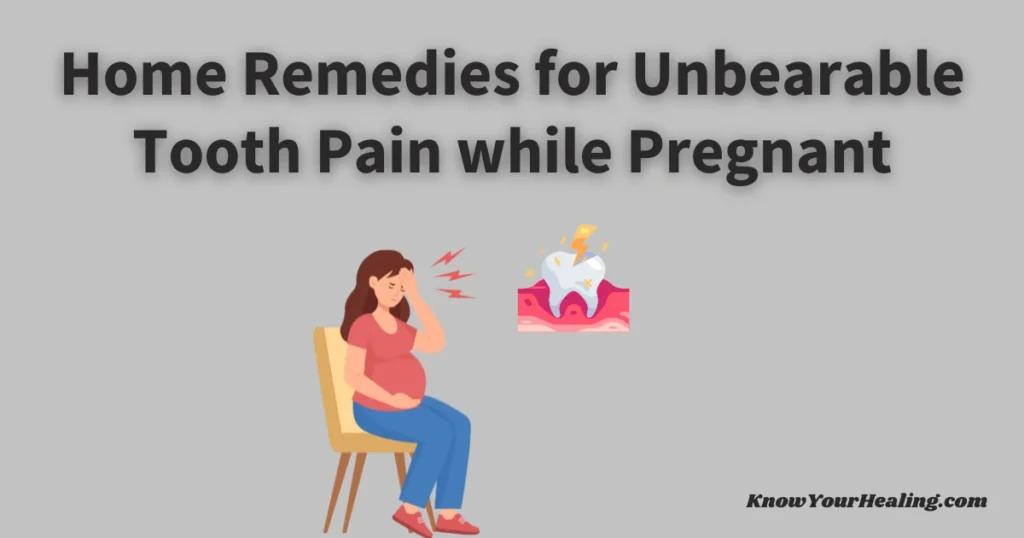Unbearable tooth pain while pregnant home remedies can be particularly challenging, requiring safe approaches to find relief.
When seeking comfort, expectant mothers can turn to natural and effective methods that won’t compromise their well-being or that of their baby.
Simple strategies like using a saltwater gargle or applying a cold compress can significantly alleviate discomfort.
Pregnancy often brings changes that may affect dental health, leading to pain that needs careful management.
Knowing what remedies are both safe and beneficial is essential for easing the pain without resorting to unnecessary medications.
You can explore a range of trusted home remedies, such as rinsing with a saltwater solution, drinking ice water, and using a cold press for inflammation.
Many pregnant women seek natural solutions to reduce toothache discomfort efficiently and safely.
They can consider techniques like maintaining good oral hygiene and possibly using baking soda as a remedy, as suggested by Crest.
With these tips, finding relief can become more straightforward while prioritizing health and safety.
Causes of Tooth Pain During Pregnancy

Pregnant women often experience tooth pain due to various factors associated with pregnancy.
Hormonal changes can affect oral health, and certain common dental problems can arise during this time, leading to discomfort and pain.
Hormonal Changes and Their Impact on Oral Health
Hormonal changes during pregnancy can significantly affect oral health.
Increased hormone levels, such as progesterone and estrogen, increase blood flow to the gums, making them more sensitive and prone to inflammation. This can result in pregnancy gingivitis, where gums become swollen, red, and bleed easily.
Pregnant women may also notice higher tooth sensitivity due to these hormonal shifts.
It’s essential to maintain good oral hygiene by brushing regularly with fluoride toothpaste and flossing to minimize plaque buildup.
A warm salt water rinse (a teaspoon of salt in a glass of water) can temporarily relieve sore gums.
It’s advisable to visit a dentist for professional dental care to manage these symptoms effectively.
Common Dental Problems in Pregnant Women
Some dental issues are more prevalent among pregnant women.
The risk of tooth decay increases due to higher acid exposure from morning sickness, where stomach acid can erode tooth enamel.
Sugary cravings common in pregnancy can contribute to this issue by feeding harmful bacteria that cause cavities.
Hormonal changes can also exacerbate existing dental issues like wisdom tooth pain or lead to new ones, such as gum disease.
Pregnant women should seek regular dental check-ups to address these problems.
Home remedies like clove oil on a cotton ball can quickly relieve an aching tooth, while an ice pack applied to the affected area can help reduce swelling and severe pain.
Avoiding sugary foods and maintaining a healthy diet are crucial preventive measures against dental problems.
Home Remedies for Tooth Pain Relief

Unbearable tooth pain can be particularly troublesome for pregnant women due to hormonal changes and restricted pain relief options. Effective home remedies can provide comfort without adverse effects.
Using Clove Oil for Pain Relief
Clove oil has long been praised for its potential to relieve toothache pain.
It’s known for its natural anesthetic and antibacterial properties, which can help soothe an aching tooth.
Pregnant women experiencing tooth sensitivity can dampen a cotton ball with a small amount of clove oil and gently apply it to the affected area.
This method may assist in providing temporary relief while maintaining good oral hygiene.
This approach is efficient for wisdom tooth pain. However, to ensure safety, it’s best to consult a dentist before using clove oil, especially during pregnancy.
Saltwater Rinse for Temporary Relief
A saltwater rinse is one of the best ways to provide quick relief from dental problems like gum sensitivity or soreness.
Mix a teaspoon of salt into a glass of warm water and swish it around the mouth. This helps flush out food particles and reduce swelling.
The antibacterial properties of salt can help combat harmful bacteria, lessening the risk of tooth infections.
This method may be particularly useful for pregnant women, as it is gentle and has no adverse effects on pregnancy.
It’s also beneficial for preventing pregnancy gingivitis by minimizing dental plaque.
Aloe Vera and Other Natural Antibiotics
Aloe vera is known for its soothing and antibacterial properties.
Applying fresh aloe vera gel can help reduce swelling and alleviate discomfort, especially in an infected area or with gum disease.
Alongside aloe vera, other natural antibiotics, such as a garlic paste, may offer relief.
Garlic’s natural compounds can kill bacteria, causing infection.
These natural ways might be important for pregnant women who need alternatives to conventional dental procedures.
Regular application can significantly improve oral health and prevent further complications.
It’s important to always discuss these options with a healthcare provider before proceeding.
Practical Tips for Managing Tooth Pain at Home

Pregnant women experiencing unbearable tooth pain can find relief with home remedies.
These methods are designed to manage symptoms related to various physical changes during pregnancy, such as hormonal shifts and increased blood flow, which can affect oral health.
Cold Compresses and Ice Packs
Using cold compresses or ice packs can be effective in reducing tooth pain.
Applying an ice pack to the affected area helps numb the pain and decrease inflammation.
It is advisable to wrap the ice pack in a cloth and hold it on the cheek near the aching tooth for 15-20 minutes.
Repeat as needed for temporary relief, but never place ice directly on the skin, as it can irritate.
Warm Salt Water and Hydrogen Peroxide Rinse
A warm salt water rinse is a simple yet effective home remedy for tooth pain.
Dissolving a teaspoon of salt in a glass of warm water provides a rinse that can reduce bacterial growth and soothe inflamed gums.
Saltwater rinses are safe during pregnancy and help wash away food particles, reducing the risk of bacterial infections.
Adding a small amount of hydrogen peroxide can enhance the rinse’s antibacterial properties. However, it’s important to spit out the solution rather than swallow it.
Dietary Considerations for Tooth Pain
Diet plays a crucial role in managing tooth pain.
Avoiding sugary foods that can cause tooth decay is vital.
Pregnant individuals should focus on a healthy calcium and vitamin D diet to support dental health and strengthen tooth enamel.
Consuming foods that may worsen tooth sensitivity, like extremely hot foods, should be limited.
Including natural remedies like clove oil diluted in a cup of warm water offers additional pain relief due to its antibacterial and anti-inflammatory properties.
When to Seek Professional Dental Care

Unbearable tooth pain during pregnancy can be distressing. While home remedies like clove oil and saltwater rinses provide temporary relief, certain situations require professional dental care to ensure the mother and baby’s health.
Importance of Regular Dental Check-Ups
Regular dental check-ups are crucial for pregnant women to maintain good oral health.
Hormonal changes during pregnancy can increase gum disease risk, making oral health monitoring essential.
A professional dental hygienist can help prevent plaque buildup, which may exacerbate gum problems.
Dental appointments allow for early identification of problems like tooth infections and wisdom tooth pain.
Regular check-ups can offer preventive measures to avoid more severe dental issues, ensuring comprehensive care throughout pregnancy.
Safe Dental Procedures for Pregnant Women
Specific dental procedures are safe for pregnant women and are sometimes necessary to treat severe tooth pain.
For instance, professional dental care can address issues like cavities and tooth infections.
Safe dental treatment options should be discussed with a dentist to avoid risks to the baby.
Treatments like teeth cleaning and addressing plaque buildup are generally safe in the second trimester.
With a proper treatment plan, procedures such as root canals can be safely performed for acute cases of unbearable tooth pain.
Pregnant women should discuss any dental problems with their dentist to ensure both their safety and that of their unborn child.
Preventive Measures for Maintaining Oral Health

Preventive measures are crucial for maintaining strong oral health, especially for pregnant women experiencing challenges such as hormonal changes and morning sickness.
Practicing good oral hygiene and seeking regular dental care can help prevent discomfort and various dental problems, such as gum disease and tooth infections.
Good Oral Hygiene Practices
Using fluoride toothpaste and brushing twice daily is one of the best ways to maintain good oral hygiene.
Flossing once a day helps remove food particles and dental plaque between teeth, where a toothbrush might not reach.
Pregnant women should also use a saltwater rinse to keep harmful bacteria at bay. Salt has mild antibacterial properties, and a teaspoon of salt in warm water can help reduce inflammation.
A soft-bristled toothbrush can prevent irritation of sensitive gums, which is especially common in pregnancy due to increased blood flow and hormone levels.
Limiting sugary foods and drinks minimizes the risk of tooth decay and staining.
Rinsing with a diluted hydrogen peroxide rinse can temporarily relieve gum issues.
Preventing Dental Problems with Regular Care
Regular dental check-ups are vital for identifying and addressing potential dental problems before they cause severe tooth pain.
Professional dental care, including cleanings and examinations, can help monitor gum health and ensure that any changes in oral health are promptly managed.
Dentists can also provide guidance on the safety of various dental procedures during pregnancy, helping mitigate risks of dental infections or complications.
Pregnancy gingivitis is a common issue; hence, regular visits can help manage inflammation efficiently.
Dental hygienists may recommend additional treatments or home remedies, like clove oil for affected areas, to offer quick relief from minor discomforts.
It’s also advisable to discuss any temporary relief methods and suitable pain medications with a healthcare provider to avoid adverse effects.
Final Thoughts
Unbearable tooth pain during pregnancy can be challenging. It’s important to approach this problem cautiously, considering both the mother’s comfort and the baby’s safety.
Home remedies can offer some relief and are worth exploring.
Gentle oral hygiene practices, like brushing and flossing carefully, can help maintain dental health. Rinsing with salt water can both ease discomfort and reduce inflammation.
Applying a cold compress may also provide some relief.
Pregnant individuals experiencing tooth pain might find garlic and cloves helpful due to their natural soothing properties. Garlic has known benefits for managing infections.
Key Takeaways:
- Regular Care: Brush and floss gently to prevent further issues.
- Natural Rinses: Use salt water rinses to soothe and clean.
- Pain Relief: Apply cold compresses to ease inflammation.
- Natural Remedies: Consider garlic for its antibacterial properties.
Consulting with a dentist is always good to ensure safe and effective treatment options.
Frequently Asked Questions
Managing tooth pain during pregnancy requires careful consideration of safe treatments. It is important to find effective relief methods that don’t pose risks to the mother or baby.
How can I stop a toothache fast while pregnant?
Rinsing with warm salt water can help reduce inflammation and soothe pain. A cold compress on the outside of the cheek may also provide relief.
For more methods, checking with a healthcare provider is crucial.
How to stop throbbing nerve pain in the tooth?
Applying clove oil directly to the affected area can help numb the pain. Clove oil has natural numbing properties that may temporarily reduce discomfort.
It is always advisable to consult a dentist for severe pain.
How can I sleep with a toothache while pregnant?
Propping up with extra pillows can help reduce blood flow to the head, which may alleviate pain. Using a cold compress before bed may also offer relief.
Avoiding foods that trigger pain before sleep is recommended.
Should I go to the ER for tooth pain while pregnant?
If the tooth pain is severe and is accompanied by swelling or fever, visiting the ER may be necessary.
It’s imperative to address any potential infections promptly to avoid complications.
What can I use to numb my tooth while pregnant?
A small clove oil applied to the tooth can offer temporary numbing. Over-the-counter options should be used with caution and under the guidance of a healthcare professional.
How do I get rid of toothache fast?
Gently brushing and flossing to remove debris and rinsing with warm salt water can help. Applying a cold compress to the cheek may also quickly relieve pain.
Can a pregnant woman remove an aching tooth?
Tooth extraction may be necessary sometimes, but it should be discussed thoroughly with a dentist. Timing and health considerations should be reviewed.
What do I do if I have a tooth infection while pregnant?
Contacting a dentist immediately is crucial. Antibiotics may be prescribed, and treatment should not be delayed as infections can lead to more serious health issues.
Which painkiller is safe for toothache during pregnancy?
Acetaminophen is generally considered safe for pain relief during pregnancy. However, it should be taken under medical supervision to ensure safety for both mother and baby.
What is the strongest natural antibiotic for tooth infection?
Garlic is known for its natural antibiotic properties. Chew raw garlic cloves or apply garlic paste to the affected area. However, it’s essential to seek professional dental advice for infections.




